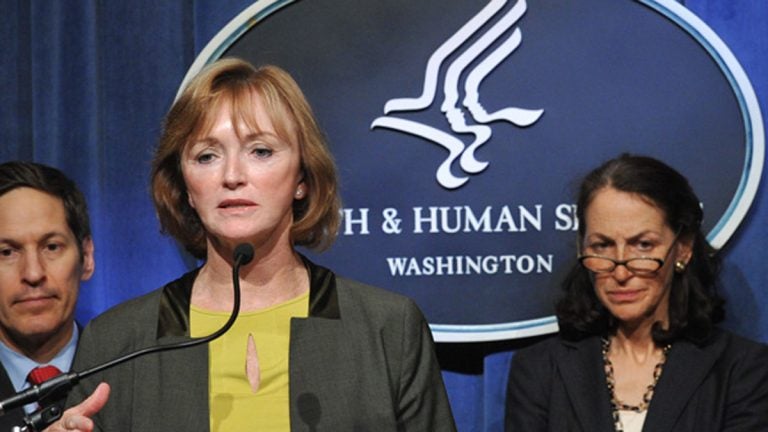Thousands could lose health coverage in New Jersey because of unclear immigration status

Marilyn Tavenner, administrator for the Centers for Medicare & Medicaid Services, noted this week that federal officials have been trying for weeks to reach marketplace enrollees about inconsistencies in their application documents.
Nearly 10,000 New Jersey residents are in danger of losing their health insurance since the federal government doesn’t have proof of their citizenship or immigration status.
That has prompted federal officials and local healthcare advocates to begin a push to reach those people before they lose their coverage.
The approximately 9,600 residents in question bought insurance through the federal insurance marketplace, which began enrolling residents last fall for health plans that started Jan. 1. The marketplace and state-based exchanges were a central provision of the 2010 Affordable Care Act.
The ACA limited access to the marketplace to U.S. citizens and immigrants with permanent resident — or “green card” — status. Problems arose for some marketplace enrollees when the Social Security or permanent resident card number they provided in their application didn’t match federal records.
Now, they must provide documents confirming their status by Sept. 5 or they will lose their health insurance on Sept. 30.
It’s not clear whether some of the 9,600 residents are undocumented or illegal immigrants. Federal officials said the inconsistency between the applications and federal records doesn’t necessarily mean there is a problem with an individual’s insurance marketplace eligibility.
But it does mean that more information is needed to verify the resident’s status.
“However, if these supporting documents are not received, health insurance plans will be terminated in order to ensure program integrity and protect taxpayer dollars,” according to a statement from the Centers for Medicare & Medicaid Services (CMS).
CMS officials said the 9,600 New Jersey residents were among 310,000 consumers nationally who haven’t responded to federal attempts to contact them via mail, email and telephone. Federal officials have been able to close roughly 450,000 other cases and have made progress on an additional 210,000 cases. The marketplace administration began sending notices this week informing the remaining people of the imminent potential loss of their coverage.
The issue has raised concerns among Garden State healthcare advocates.
Maura Collinsgru of New Jersey Citizen Action said that some residents are likely unaware of the urgency of the situation.
“It’s another situation where our concern is heightened by the lack of involvement from the state of New Jersey,” said Collinsgru, referring to Gov. Chris Christie’s rejection of a state-based exchange and the subsequent loss of federal funding.
Collinsgru said state and local advocates will be reaching out to residents, but their capacity to reach the entire public in a brief period of time is limited.
“Community-based organizations, enrollment assisters and healthcare providers are all working to get the word out in their communities, but it would really help to have a governor who would amplify the message,” Collinsgru said.
Earlier this year, the Christie administration requested that $7.67 million in federal funding that had been awarded to the state to support a state exchange instead be largely used to support expansion of Medicaid eligibility.
Federal officials indicated they would only have approved using the money for marketplace-related expenses, including marketing, a use supported by healthcare advocates. But the state didn’t agree to that condition, and lost the funding.
Collinsgru said the possibility that some residents could lose health insurance due to a lack of information about proper documentation highlights the importance of keeping the public informed about the marketplace. The ACA provided funding for outreach for state-based exchanges, leaving limited funds for federal marketplace outreach.
“The task here is really one of education,” Collinsgru said.
The federal health insurance marketplace also faces a potentially major legal challenge over whether low- to middle-income marketplace enrollees are eligibile for federal tax credits to subsidize their insurance purchases.
At the end of the last open enrollment period in mid-April, there were 161,775 people in New Jersey who had enrolled in marketplace insurance plans. No official updates on either additional enrollees or the number of enrollees who are paying for their insurance have been released since then. The next open enrollment period begins on Nov. 15.
Christie did agree to expand Medicaid eligibility, which has led to a more than 200,000-person increase in New Jersey FamilyCare enrollment.
CMS Administrator Marilyn Tavenner noted in a statement that federal officials have been trying to reach marketplace enrollees about inconsistencies in their applications for several weeks.
“We want as many consumers as possible to remain enrolled in Marketplace coverage, so we are giving these individuals a last chance to submit their documents before their coverage through the Marketplace will end,” she said.
Federal officials are urging people who receive the notices to log onto their accounts on the marketplace website, and select their current application to upload their documents. They can also find information on the site about local organizations that can help with the application.
In addition, they can call (800) 318-2596 to learn what documents they need to submit and whether the marketplace administrators have received their information.
Two more rounds of phone calls and one more email will be sent to the 9,600 affected New Jerseyans before the deadline. Those who don’t respond will then receive a final cancellation notice.
“Since this is an urgent matter, we are activating our networks on the ground to reach people directly in the communities where they live,” Tavenner said. “Whether it is online, via our call center, or with one of our local partners, consumers will have a number of ways to find the help they need to continue their coverage.”
Another round of data verification — focusing on inconsistencies between enrollees’ reported and federally recorded incomes — will occur later this year.
__________________________________
NJ Spotlight, an independent online news service on issues critical to New Jersey, makes its in-depth reporting available to NewsWorks.
WHYY is your source for fact-based, in-depth journalism and information. As a nonprofit organization, we rely on financial support from readers like you. Please give today.




